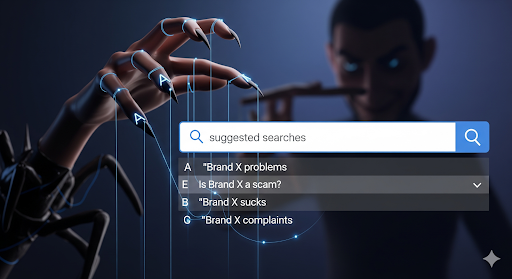You’ve seen it before. You start typing your company’s name into a search bar — and before you even finish, the screen fills with suggestions you never asked for. Some are neutral. Others are… not. A few even link to claims you know aren’t true.
This isn’t an accident. In competitive markets, those auto-suggestions can be quietly shaped by outside forces. Sometimes it’s subtle SEO manipulation. Other times, it’s deliberate reputation sabotage — a way for competitors to seed negative associations before a potential customer ever clicks a single link.
And because suggested searches feel like they come from the search engine itself, they carry unspoken authority.
What Suggested Searches Really Do
Suggested searches aren’t just convenience features. They’re powerful signals that guide where people click and what they believe.
The logic is simple:
- People assume suggestions reflect the most relevant or popular queries.
- Curiosity leads them to click on negative or sensational terms — even if they weren’t looking for them in the first place.
- Once they click, those results gain more traction, keeping the cycle going.
A single negative phrase can redirect a potential sale into a competitor’s hands.
How Competitors Influence the List
Competitors don’t need direct access to a search engine to shape its suggestions. They work indirectly, using tactics that mimic organic trends:
- Content flooding — Publishing multiple pages targeting a brand name alongside negative terms.
- Search behavior manipulation — Encouraging coordinated searches for damaging phrases to train the algorithm.
- Link association — Building backlinks that pair a brand with unfavorable keywords.
Over time, these signals tell the search engine, “This is what people want to know about this brand.”
Why It’s So Damaging
When people see your name linked to a negative term before they even hit Enter, it:
- Erodes trust instantly — Perception shifts before they read a single review or article.
- Shifts attention away from your strengths — Even the best marketing can’t compete with the pull of curiosity-driven clicks.
- Extends the life of old problems — Past issues that were resolved can reappear simply because they get reinforced in suggested searches.
Brand trust isn’t built in the suggestions — but it can be destroyed there.
Spotting the Signs of Manipulation
Early detection is critical. Warning signs include:
- New, negative terms are appearing suddenly alongside your brand name.
- Spikes in traffic to outdated or irrelevant negative content.
- Sudden drops in search visibility for positive or neutral brand terms.
Brands that partner with firms like NetReputation often discover these trends during routine monitoring — long before they show up as public relations crises.
How to Protect Your Brand from Suggested Search Sabotage
1. Flood the Space with Positive Associations
Produce high-quality, keyword-targeted content that ties your brand name to positive or neutral terms. Publish it consistently so the algorithm sees fresh, relevant activity.
2. Encourage Organic, Positive Search Behavior
Customer campaigns, promotions, or branded hashtags can encourage natural searches for the right phrases — counterbalancing negative ones.
3. Monitor Like It’s a KPI
Set up ongoing monitoring for suggested search trends, just as you would track reviews or rankings. This is where professional services earn their keep — because the signals are subtle, but the stakes are high.
4. Address Negative Content at the Source
If a damaging suggestion links to a misleading or false page, take steps to correct or remove it. This might mean contacting site owners, issuing factual clarifications, or pursuing legal remedies in extreme cases.
The Legal and Ethical Line
While suggested search manipulation can be hard to prove, patterns of defamation, misinformation, or deliberate brand damage may cross legal thresholds. If the terms appearing against your name are false and harmful, documenting the pattern and consulting legal counsel should be a priority.
Why This Can’t Be Ignored
Suggested searches aren’t just a reflection of public interest — they help shape it. If you’re not actively managing them, someone else might be. And if that “someone else” is a competitor, the suggestions they leave behind can become permanent fixtures in your brand’s online identity.
A strong defense requires speed, strategy, and the right expertise. Partnering with a reputation management firm like NetReputation can mean the difference between containing a problem and letting it define you.

